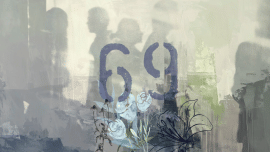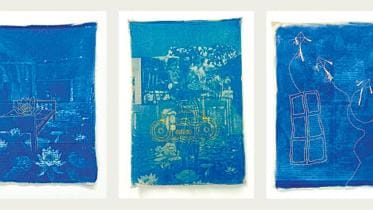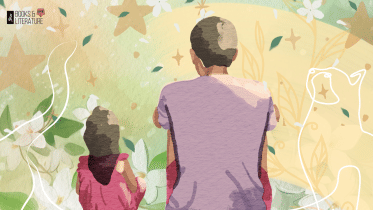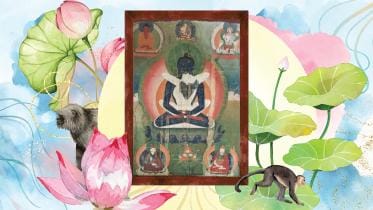CREATIVE NONFICTION / From autumn to winter in the northeast England
7 February 2026, 01:54 AM
Books & Literature
POETRY / ‘The Unnamed’ and ‘Incomplete’: Two poems
28 November 2025, 19:31 PM
Books & Literature
LITERARY CURTAINS / Adaptation as misrecognition: ‘Siddhartha’ between text, philosophy, and stage
28 November 2025, 19:30 PM
Books & Literature
CREATIVE NONFICTION / Of jasmines, departure, and desire for a déjà vu
21 November 2025, 18:28 PM
Books & Literature
CREATIVE NONFICTION / The Solitude of ’69
19 November 2025, 10:28 AM
Books & Literature
CREATIVE NONFICTION / Writer in the dark
19 September 2025, 19:09 PM
Books & Literature
CREATIVE NONFICTION / A visit before the journey
5 September 2025, 18:59 PM
Books & Literature
FICTION / The dawn’s return
5 September 2025, 18:58 PM
Fiction
Poetry / Silence, our witness
22 August 2025, 19:02 PM
Books & Literature
CREATIVE NONFICTION / Space between the scrolls
15 August 2025, 19:00 PM
Books & Literature
From autumn to winter in the northeast England
There are a few old trees with wide trunks—I do not know their names—just beside my library. I never forget to have a quick look at the leaves during coming and going to the library.
7 February 2026, 01:54 AM
‘The Unnamed’ and ‘Incomplete’: Two poems
The unnamed
You can get lost trying to
get back to the exit
at the Vatican Museum.
28 November 2025, 19:31 PM
Adaptation as misrecognition: ‘Siddhartha’ between text, philosophy, and stage
There is always a subtle tension when a story migrates across cultures. Some narratives travel with the lightness of wind, reshaping themselves almost effortlessly inside new imaginations, while others arrive heavy with the weight of the worlds that first produced them.
28 November 2025, 19:30 PM
Of jasmines, departure, and desire for a déjà vu
Shell-shocked, I talked to the office staff. They all looked sad, a little perplexed too, perhaps seeing my very unusual, distressed face.
21 November 2025, 18:28 PM
The Solitude of ’69
For the Class of ’69 at Dhaka University, that bond was embodied in one man—Syed Mayeenul Huq. He wasn’t just a friend; he was the quiet, steady centre that held their entire constellation together.
19 November 2025, 10:28 AM
Writer in the dark
There is a strange insanity that comes with being a woman in her 20s. A haunting fear that follows like a thought lingering in the back of our minds, refusing to leave.
19 September 2025, 19:09 PM
A visit before the journey
Before returning to Australia, I felt a quiet urgency to visit my elderly and ailing relatives in Dhaka. Not just a social obligation—it was something deeper, a whisper from within. I heard such visits were acts of virtue, but for me, it was more about connection, memory, and respect..A fe
5 September 2025, 18:59 PM
The dawn’s return
Long, long ago, when the world was younger, wiser, softer, when the animals were braver and the people were gentler, when art lived and music sailed, and the skies were a true, honest blue, there lived a man who loved a woman, and they lived in a little house they loved very much. How they met o
5 September 2025, 18:58 PM
Silence, our witness
This cracked, restless earth beneath our feet—
granules of memory grinding,
22 August 2025, 19:02 PM
Space between the scrolls
Children pulled from rubble in Gaza, dust-white faces against red bricks—
15 August 2025, 19:00 PM
Give back the forests, take away this city
Every night, a market forms near the mill gate. When it’s time for that market to close, Fulbanu stands on the high bank of the pond, waiting for her husband’s return.
8 August 2025, 19:12 PM
To fold a city into silence
The bus stop was empty as usual, I sat waiting for a sight of one. Then he came. A man in a faded red shirt with a bag hanging on his back, running as if the devil himself had taken out a lease on his shadow.
1 August 2025, 19:48 PM
Scorching silence
Scorching in a way the April sun never was. / Scorching in a way a fever never feels. / It wasn't just grief
18 July 2025, 19:40 PM
The pond remembers: On visiting Lojithan Ram’s ‘Arra Kulamum, Kottiyum, Āmpalum’
In a time where spectacle often overshadows sincerity, where art sometimes forgets its heart, Lojithan Ram offers a whisper. A blue whisper. And in that whisper, you may just hear your own name
11 July 2025, 18:59 PM
Ink, jasmine, and the ghost of Ma: Unlearning my father
When it comes to our fathers, especially the ones who try to be good men, a rampant affliction known as patriarchy has left us with no language to imagine them outside of what they were to others. Strip away the roles, and what’s left?
15 June 2025, 08:01 AM
Nani’s salt
Her voice, thin as a whisper, sharp as a blade, sliced through the kitchen air thick with mustard oil and regret.
13 June 2025, 19:46 PM
Runner
Like little boys racing against red-orange hues against dark, dark blue to spread the day’s news;
9 May 2025, 18:48 PM
A Bengali Buddha in Blighty
Pride of place above the fireplace in the sitting room of our little house in distant Blighty is a painting from North Bengal.
2 May 2025, 18:06 PM
Fleeting panic
“I’m scared” a voice calls out.
2 May 2025, 18:01 PM
The morgues are full
In Gaza, the names of the martyrs slip through silence, lost to a world too distracted to listen
4 April 2025, 18:00 PM
































